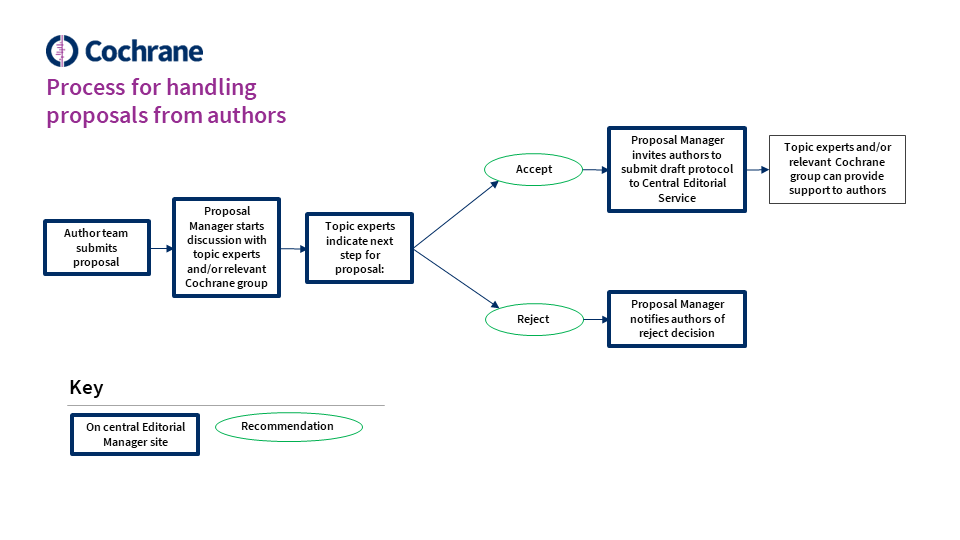
1. Proposal submission
Authors submit a proposal to conduct a new Cochrane Review to the central Editorial Manager site.
2. PICO screening
The Evidence Pipeline team screen PICO of the proposed review to help in identifying overlap with existing Cochrane Reviews and gaps in the evidence (see ‘Guidance’ item 2, below).
3. Discussion and assessment
The Proposal Manager initiates a ‘Discussion’ on the central Editorial Manager site, inviting topic experts to assess the proposal.
4. Decision to accept or reject
Participants in the discussion will make a decision to accept or reject the proposal.
5. Support for authors
After reaching a decision to accept, the topic experts can indicate their ability to provide support to the authors during the protocol development process.
6. High-profile reviews
Topic experts are also asked to flag whether the proposed article could be a high-profile or controversial review. In these cases, the Proposal Manager will contact the Cochrane Review Development team and the Communications team about potential support for the authors.
| Within Editorial Manager, topic experts are asked to consider the following questions when assessing proposals toward a decision to accept or reject: |
1. Does the proposed review cover an important question, suitable for a Cochrane Review?
Topic experts may determine that a proposal is not of importance to the Cochrane Library’s audiences, or that the question does not lend itself to being answered by a systematic review. In these cases, the proposal should be rejected.
2. Is the proposed review free from overlap with other Cochrane Reviews or protocols? If not, is overlap with an existing review justified?
Would the proposed review add to the evidence base in this topic area?
The results of the Evidence Pipeline team PICO screening will be available within Editorial Manager to help topic experts evaluate whether gaps in the evidence exist that are sufficient enough to justify overlap with existing Cochrane Library content.
If the proposal overlaps with existing content, and a new review in the same topic area is not justified, the proposal should be rejected.
3. Would you recommend that the authors be invited to submit a draft protocol?
If the proposal covers an important question, or the importance of the question is not yet fully clear, the proposal should be taken forward and the authors invited to submit a draft protocol. Using a completed protocol to assess the question’s importance allows authors to access Cochrane tools (including RevMan) and Cochrane resources.
If on submission and full assessment of the protocol, editors deem the topic is of insufficient importance for a Cochrane Review, the methods are not appropriate for the question, or the protocol is otherwise of low quality, the protocol will be rejected.
| Following a decision to accept, topic experts are also asked to consider the following opportunities for support to the authors: |
4. If you are affiliated with a Cochrane group, will your group be able to provide support to the authors in developing their protocol and review?
If you are able to provide author support, you will be copied into the acceptance email to authors, as well as the email to authors inviting a draft protocol. This will enable authors to contact you directly if they wish to seek support.
Indicating your ability to provide author support also means that the new protocol will be listed in your group’s section in Archie.
5. Is this a high-profile review?
Author teams of high-profile reviews may qualify for centralized support during the development of the protocol and review: for example, assistance in writing or running searches, assessment of analysis and GRADE ratings prior to write-up, dedicated author support with author queries before submission.
In addition, the Cochrane Communications team will be alerted to the initiation of a review marked as 'high-profile', to help to the team plan for dissemination activities. Authors of controversial reviews may also be offered support in handling engagement on their review.
Accept - Cochrane group can offer author support during protocol development
Accept - authors will work independently
Reject
High-profile reviews